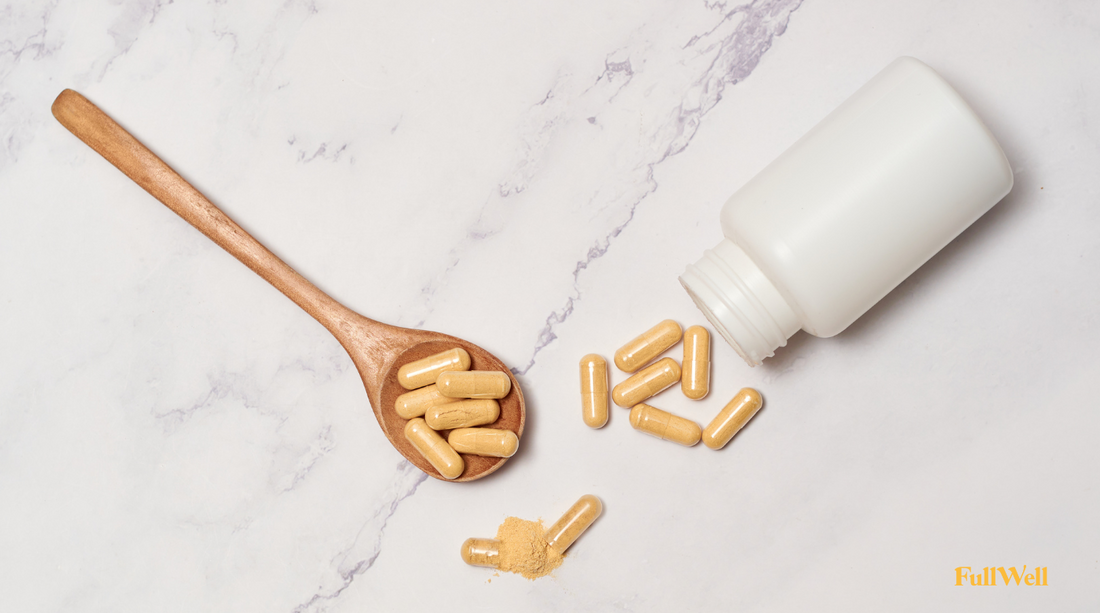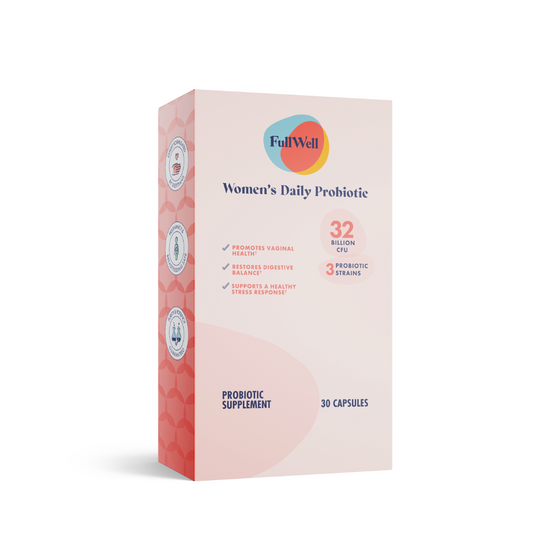Probiotics for Women
TL;DR
- Probiotics are live microorganisms often called “good bacteria” that help keep your microbiome in balance This balance is essential for a healthy digestive system, for supporting immune health, and overall well-being, including the vaginal microbiome.
- Pregnancy can cause hormonal shifts that disrupt the balance of gut bacteria, and probiotics may assist in restoring and maintaining this balance.
- Strains including L. acidophilus (La-14) ®, L. rhamnosus (HN001)™ and L. paracasei (Lpc-37) ®, provide a range of benefits for digestive health, vaginal health, and a healthy stress response.

What are probiotics?
Let’s start with the basics. Probiotics are live microorganisms often called “good bacteria” that help keep your microbiome in balance This balance is essential for a healthy digestive system, supporting immune health, and overall well-being, including the vaginal microbiome.
You can find these beneficial bacteria in fermented foods like pickles, kimchi, natto, and some fermented beverages, as well as in dietary supplements.
What is the microbiome?
Your microbiome is a collection of all the bacteria that live on and inside your body, including your digestive tract and vagina. Most of these bacteria, or microbes, are highly beneficial to us and play a crucial role in maintaining your health. Each person’s microbiome is unique and influences almost every aspect of overall health and metabolism.
What is the difference between prebiotics and probiotics?
Understanding the difference between prebiotics and probiotics can be a game-changer for your health. Here’s the lowdown:
- Probiotics: These are the friendly bacteria you find in foods like yogurt and fermented veggies, and they help keep your digestive system in check. Think of them as the beneficial bugs that support your gut’s ecosystem.
- Prebiotics: Think of these as the “food” for these friendly bacteria. They provide the nourishment to help probiotics thrive and do their job effectively. Prebiotics are found in fiber-rich foods like dandelion greens, onions, asparagus, and oats.
Should you take a probiotic?
If you’re wondering whether you should add a probiotic supplement to your routine, you’re not alone. Taking a probiotic supplement can be beneficial for many people, particularly if you’re looking to support a healthy, diverse microbiome for your overall health and wellbeing.
Probiotics can also help maintain a healthy balance of bacteria in your gut, which can be especially helpful if you’ve recently completed a course of antibiotics or are pregnant, both of which can disrupt your natural gut flora. Read on to discover why and how probiotics might be right for you.
How often should you take a probiotic?
The frequency of taking probiotics depends on the specific type and your overall health goals, with daily intake often beneficial.
Remember that not all probiotics are created equal, and one size does not fit all. The specific strains determine the benefits, and the amount of CFUs needed is guided by research. It’s not about having the most strains or CFUs, or an innovative format, it’s about the right strains, in the right amounts, in the optimal format for your body.
Work with your healthcare practitioner to tailor a probiotic regimen that fits your needs.
Can you take a probiotic while pregnant?
Yes, you can—and it may be beneficial! Pregnancy can cause hormonal shifts that disrupt the balance of gut bacteria, and probiotics may assist in restoring and maintaining this balance (1, 2).
A balanced microbiome supports fertility and overall reproductive health ensuring that nutrients reach both mom and baby, helps to create essential vitamins, and supports immune health (3, 4, 2).
Benefits of probiotics for women
Incorporating probiotics into your daily routine can help you feel more balanced and well, both inside and out! Here’s how they can make a difference:
Probiotics and fertility
A healthy stress response is essential for fertility at every stage. Prolonged stress can disrupt hormones, impacting menstruation, ovulation, implantation, and placental development, ultimately affecting the chances of conception (5, 6). Probiotics can help support a healthy stress response, promoting overall well-being and reproductive health.
Additionally, a balanced gut microbiome enhances fertility by improving nutrient absorption, synthesizing essential vitamins, and supporting immune function (3, 4, 2).
Probiotics and pregnancy
During pregnancy, hormonal shifts can lead to significant changes in gut bacteria, sometimes causing an imbalance known as dysbiosis (1, 2). The right balance of good bacteria is vital not only for your health but also for your baby’s development, immune health and gut health (7, 8).
A recent study found that combining fish oil with probiotics like L. rhamnosus (HN001)™ and Bifidobacterium lactis can change the vaginal microbiome, reducing harmful bacteria in pregnant women (9). Additionally, taking L. rhamnosus (HN001)™ during pregnancy may support healthy blood sugar regulation, especially in older women or those with a history of gestational diabetes, improving outcomes for both mom and baby (10).
Probiotics and vaginal health
Probiotics offer more than just gut health benefits—they're essential for female reproductive health too. The vaginal microbiome, mainly composed of Lactobacillus bacteria, helps maintain a healthy environment, highlighting its importance to overall well-being (11).
A healthy vaginal microbiome supports not only pregnancy (9) but also helps support overall vaginal health, helping to maintain a healthy vaginal pH and microbial population (11, 12, 13, 14, (15).
Probiotics for gut health
Probiotics are fantastic for digestive health, especially if you’re dealing with bloating or constipation (16). Strains like L. paracasei (Lpc-37) ® and Bifidobacteria can help ease gas and improve overall digestive comfort (16).
While more research is needed, these findings are super encouraging for anyone looking to boost their digestive health! (17).
Probiotics and mental health
Managing stress is vital for fertility, as prolonged stress can disrupt hormones and interfere with everything from ovulation to implantation.
Some probiotic strains, like L. paracasei (Lpc-37) ®, have been shown to promote a healthy stress response and support physiological and psychological stress responses, enhancing general mental well-being (18). Its effects can vary depending on factors like your stress levels and gender, with the study indicating that L. paracasei (Lpc-37) ® reduced perceived stress in women, but not men. (18).
Studies also show that L. rhamnosus (HN001)™ helps support positive postpartum mood compared with placebo (19). Although the exact mechanisms behind these positive effects are still being explored, the initial findings are promising (18).
What is the best probiotic for women?
Convinced on the benefits and looking for a daily probiotic for women? We’ve got you covered!
FullWell’s Women’s Daily Probiotic
FullWell’s Founder and Registered Dietitian, Ayla, developed the only comprehensive probiotic supplement with meticulously matched strains studied for women’s unique needs throughout their reproductive health journey. Our Women’s Daily Probiotic combines 32 billion colony-forming units (CFU) of L. acidophilus (La-14) ®, L. rhamnosus (HN001)™ and L. paracasei (Lpc-37) ®, a combination that’s ideal for digestive health, vaginal health, and a healthy stress response . As with all of our products, we always uphold the same meticulous attention to our manufacturing processes and testing protocols as we do to our formulations. What that means is that our products undergo rigorous double testing, first by the manufacturer for strain quality, and then again by us through a third party, to ensure that what’s on the label is precisely what you’re getting—nothing more, nothing less. Plus, we proudly offer our test results for full transparency, no questions asked.
And if you’re wondering if it’s safe for pregnancy and breastfeeding, it is! The strains in our formula are supported by a long history of safe use with no serious adverse effects reported in clinical studies across diverse populations, including pregnant and breastfeeding women.





